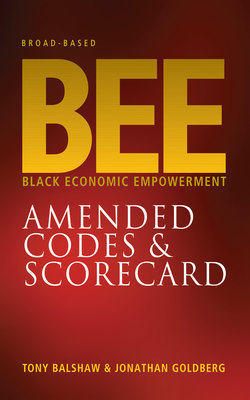Читать книгу Broad-Based BEE - Jonathan Goldberg - Страница 5
На сайте Литреса книга снята с продажи.
Оглавление| 1 | RATIONALE FOR BROAD-BASED BEE |
“It is not the strongest species that survive, nor the most intelligent, but the one most responsive to change.” – Charles Darwin
Black economic empowerment (BEE) arguably continues to be the greatest strategic issue, challenge, threat and potential opportunity facing businesses of all sizes, structures and shapes in South Africa today. It is a government initiative to promote economic transformation in order to enable meaningful participation in the economy by black people.
The socioeconomic imbalances that existed for decades (even centuries) required reform, greater ethical conscience and “ploughing back” to ensure the long-term survival of companies.
BEE has been described as an investment that is a matter of survival for South Africa and the economy. It is aimed at effecting a more equitable distribution of economic wealth and has been branded as the essential second wave of transformation after democratisation and the political miracle. South Africa’s first democratic government was elected in 1994 with a clear mandate to redress the inequalities of the past in every sphere: political, social and economic.
Twenty years have now passed since South Africa’s democratisation yet unemployment levels remain stubbornly above the 7 million mark with negative consequences such as social unrest. On reflection many are saying that the pace of transformation has not been good enough.
South African businesses have had to face major strategic integration issues relating to the country’s reincorporation into the global economy as well as to government initiatives and related regulations aimed at transforming the socio-economic environment for the majority of the country’s citizens. The market-driven economic environment has been characterised by sustained economic growth and resilience.
It must be asked if, twenty years on, is BEE still necessary particularly in the form of the Amended Codes which have the potential to be a regressive step for the fragile South African economy?
There is no doubt that the challenge of economic transformation, propelled by black economic legislation, demands our urgent attention. BEE is a reality and a business imperative. Companies which have failed until now to respond need to do so quickly or face the cheerless prospect of not being in business in a comparatively short period of time.
There are two primary drivers of broad-based BEE:
•first, the altruistic driver – those people who believe “it’s the right thing to do” and have bought it onto the national agenda;
•secondly, those who recognise that broad-based BEE is a strategic imperative, understanding that it makes good business sense.
The latter will more than ever constitute the sustainable driver for embracing the Amended Codes.
BEE continues to have a huge impact on the way business is done in South Africa – for large corporates, family businesses, small and medium-sized businesses, professional practitioners. Quite simply, BEE impacts, in one form or another, on almost every participant in the South African economy. The impact, unlike other legislative interventions, is more indirect and not mandatory on businesses from a legislative-legal point of view but the public sector imperative that every organ of state and public entity must apply the Amended Code of good practice will drive compliance. This is notwithstanding the fact that the compliance standard and requirement is voluntary and self-regulatory for all entities other than state-owned entities. Entities are examining whether BEE compliance is still worth the cost.
The complexities of the how, who, when and what of broad-based BEE is the main cause of concern and perceived threat for many business owners and managers, particularly because BEE touches a raw nerve – ownership and control. The issuing of extremely onerous and complex Amended Codes of Good Practice is adding to the concerns.
